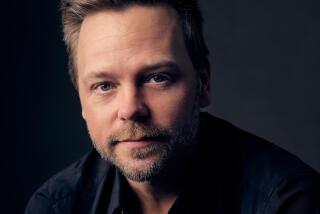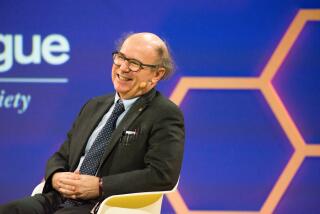Review: Jim Holt’s compelling ‘Why Does the World Exist?’
Why Does the World Exist?
An Existential Detective Story
Jim Holt
Liveright: 310 pp., $27.95
“How old is the Universe?” Kurt Vonnegut asked in his 1973 novel “Breakfast of Champions.” “It is one half-second old, but that half-second has lasted one quintillion years so far. Who created it? Nobody created it. It has always been here.”
For all its breeziness, that still seems to me a pretty good cosmology, one that expresses the essential intractability of everything. And yet, if Jim Holt’s deft and consuming “Why Does the World Exist?: An Existential Detective Story” has anything to tell us, it’s that such a comment is less about literary riffing than deep philosophy.
Holt describes a French TV show in which a priest, a physicist and a Buddhist monk discuss a “metaphysical question, one that was originally posed three centuries ago by Leibniz: … Why is there something rather than nothing?” The priest invokes God, the physicist quantum mechanics, but it is the monk who frames the conversation most vividly. “As a Buddhist, he says, he believes that the universe had no beginning. … Nothingness … could never give way to being, he says, because it is defined in opposition to that which exists. A billion causes could not make a universe come into existence out of what does not exist. That is why, the monk says, the Buddhist doctrine of a beginning-less universe makes the most metaphysical sense.”
That question — “Why is there something rather than nothing?” — occupies the center of Holt’s book, which is by turns a philosophical and scientific inquiry, written through a broadly personal lens. Beginning with his discovery of this “ultimate why question” as a teenager reading Heidegger, Holt frames his investigation as a series of conversations with luminaries from the academic and cultural worlds.
In these pages, we meet Sir Roger Penrose, who in 1970 with Stephen Hawking showed that the Big Bang “must have been a singularity” — a self-contained event with no deterministic cause. We hear from Nobel physics laureate Steven Weinberg and novelist John Updike, University of Pittsburgh philosopher Adolf Grünbaum and theologian Richard Swinburne. The subjects share a curiosity, a quality of engagement, in the face of everything they cannot know.
What Holt is asking, after all, is unanswerable, which means that any response, even the most nuanced, must be conditional in the most fundamental sense. “Would the search prove futile?” the author wonders after visiting Weinberg in Austin, where he teaches at the University of Texas. “Perhaps. But that made it all the more noble, in a Sisyphean way.”
Such a reference, of course, can’t help but suggest Albert Camus who 70 years ago dared us to “imagine Sisyphus happy” as a way of coming to terms with a universe that was inherently absurd.
For Holt, though, absurdity is not enough, since any universe, even one with no beginning, has an internal logic of its own. He makes the point succinctly from the outset: “The idea,” he writes, “that the world somehow holds the key to its own existence — and hence that it exists, necessarily, not as an accident — jibes with the thinking of some metaphysically inclined physicists, such as … Penrose, and the late John Archibald Wheeler (who coined the term black hole).”
And yet, because this key necessarily eludes us, Holt also takes a perverse pleasure in doubling back, raising questions and then poking holes in them at once.
Grünbaum, for instance, whose philosophy is rooted in a deep-seated distrust of religion, argues that most cosmology is theological in nature because “it presupposes that there must be some explanation for the existence of the world.” This is a problem, he continues, not least because it remains largely unexamined by philosophers and scientists alike.
“Even today,” Holt explains, “when we ask why there is something rather than nothing at all, we are, wittingly or not, heirs to a way of thinking that is a vestige of early Judeo-Christianity.” That’s a key point, and one we remember later in the book when thinkers such as Penrose or Swinburne or the Oxford University-educated philosopher John Leslie discuss the creation of the universe in ethical terms.
What are these terms? In many ways, they go back to Leibniz, who posited that we live in “the best of all possible worlds.” As Holt points out, Voltaire satirized Leibniz in “Candide,” and his critique — how can this be a good world when it is ravaged by tragedy and evil? — remains relevant. And yet, throughout “Why Does the World Exist?” the idea of a universe built on good or perfection is still in play.
We’re talking about God here, although as you’d expect that takes as many forms as there are sources in the book. For Penrose, it’s a matter of Platonic ideals, which he believes are the building blocks of the universe. For Swinburne, it’s a matter of conceptualizing a God who not only makes us suffer but also “has an obligation to suffer with us.” But even Swinburne “concedes that he can find no explanation for God himself, whose existence, compared to the stark simplicity of Nothingness, strikes Swinburne as ‘vastly improbable.’” So where does this leave us?, Holt wonders. Is cosmology just a parlor game, in which our only choice is to take a leap of faith?
The most compelling answer comes from Weinberg, whom Holt visits, fittingly, at the halfway point of the book. Weinberg disdains the theological option: “With or without religion,” he avers, “you would have good people doing good things and evil people doing evil things. But for good people to do evil things, that takes religion.” Yet he also questions the ability of theoretical physics to explain not just the mechanism of the universe but also its animating impulse.
The trouble with cosmological conjectures, he tells Holt, “is that we have no way, at present, of deciding whether they’re true or not. It’s not just that we don’t have the observational data — we don’t even have the theory.”
Equally problematic, even a so-called “final theory” (“one that would tie up all the forces of nature…into a single neat mathematical package”) may never answer the question of why. This may well continue to be the case even with the announcement last week that the Higgs boson, otherwise known as the “God particle,” almost certainly exists. “The more the universe seems comprehensible,” Weinberg has written, “the more it also seems pointless.” This is the paradox, not only for Weinberg but for Holt too.
More to Read
The biggest entertainment stories
Get our big stories about Hollywood, film, television, music, arts, culture and more right in your inbox as soon as they publish.
You may occasionally receive promotional content from the Los Angeles Times.











